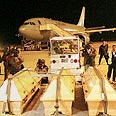
Previous prisoners deal
צילום: איי פי
Redeeming the soldiers: Surrender to terror?
Is the fear of more abductions stronger than the mitzvah to redeem our soldiers? Does one family's concern justify the pain of others? Head of terror victims group vs. bereaved father










